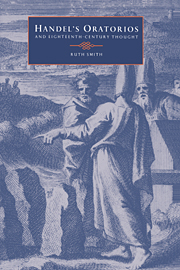Book contents
- Front Matter
- Contents
- Acknowledgements
- Abbreviations
- Introduction
- PART 1 ENGLISH ORIGINS OF ENGLISH ORATORIO
- PART II THE PATRIOT LIBRETTO FROM THE EXCISE BILL TO THE JEW BILL: ISRAELITE ORATORIOS AND ENGLISH POLITICS
- Appendix I Libretto authors and sources
- Appendix 2 The oratorios and Methodism
- Notes
- Bibliography of sources cited
- Index
- Front Matter
- Contents
- Acknowledgements
- Abbreviations
- Introduction
- PART 1 ENGLISH ORIGINS OF ENGLISH ORATORIO
- PART II THE PATRIOT LIBRETTO FROM THE EXCISE BILL TO THE JEW BILL: ISRAELITE ORATORIOS AND ENGLISH POLITICS
- Appendix I Libretto authors and sources
- Appendix 2 The oratorios and Methodism
- Notes
- Bibliography of sources cited
- Index
Summary
A knowledge of the context remains necessary to a knowledge of the innovation
J. G. A. Pocock, Virtue, Commerce, and History: Essays on Political Thought and History, chiefly in the Eighteenth Century (Cambridge, 1985)PURPOSE AND SCOPE
This book is about the words of Handel's oratorios. In recent decades concern for historical authenticity has transformed our reception of baroque music, Handel's included. Scholarly performers strive to recreate for modern ears the sounds that the composers' first audiences would have heard; music historians increase modern understanding and enjoyment of the music by explaining its historical contexts. This book aims to bring a complementary historical perspective to our understanding of the librettos – the verbal texts – of a mainstay of western culture, Handel's English oratorios.
It might be thought that such familiar works do not need this treatment. After all, what is obscure or recondite about, for example, Messiah or Judas Macchabæus? Their continual performance by people of every kind from the date of their composition to the present proves their accessibility. But though the music is accessible, the point of the words which Handel set frequently eludes us. To some of us they are so familiar that we tend not to hear them, far less think what they mean. Those who have listened to them critically in the twentieth century have often damned them as worthless.
- Type
- Chapter
- Information
- Handel's Oratorios and Eighteenth-Century Thought , pp. 1 - 40Publisher: Cambridge University PressPrint publication year: 1995

